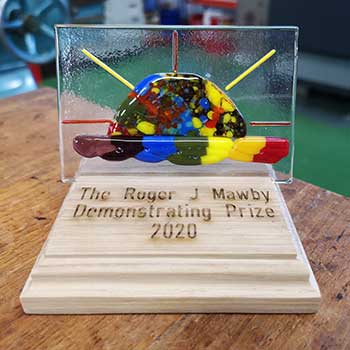Roger J Mawby Demonstrating Award Winners 2020
The outstanding performance of six Chemistry Graduate Teaching Assistants (GTAs) has been recognised in this year’s Roger J Mawby Demonstrating Awards.

The annual awards recognise the important contribution made by GTAs to undergraduate teaching in the Department of Chemistry. Prizes are awarded thanks to a generous bequest made to the Department in memory of Roger J Mawby, an inspirational educator and one of the founding academic staff members of Chemistry at York. Up to six students who have gone above and beyond the requirements of the GTA role, as judged by the Awards Panel, receive the award each year.
Each of this year’s winners receives a cash prize of £150 to be spent as they wish, and a glass trophy made by Chemistry glassblower Abby Mortimer.
This year’s winners are:
Conor Black
For incredibly diligent teaching, especially in Year 1. Conor puts great efforts into understanding the background behind the experiment, which is used to help students (and other GTAs where needed!) to a very high standard.
Paul Bond
For exceptional effort in writing a simulation software for the ICP course in a few weeks, allowing the key experimental design aspects of the course to be preserved. Student feedback for the course was exceptional.
Chris Goult
For efforts on the MChem Schlenk line experiment. Chris's calming influence makes for a very effective educator and is very supportive of students. Delivers information clearly and concisely, particularly important in avoiding risk and ensuring equipment is used correctly.
Nina Leeb
Nina is always bursting with enthusiasm across all her teaching and takes great pride in her work. She tries to get the best out of every student.
David Loades
Incredibly organised, efficient and always working hard to help students get the best out of themselves. Very patient and thorough in everything he does.
Anna Patterson
Always friendly and willing to help the students. Patiently helps students to overcome their own problems and develop their learning. Continuously seeks to identify improvements to experiments to improve the future running of the course.